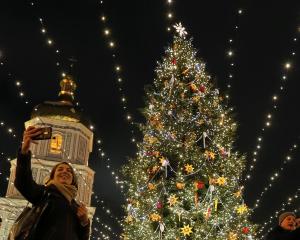
Christmas has been cancelled at nearly a third of Kiwi businesses this year, a survey has revealed.
The Seek workplace survey found 32% of businesses would not be holding a staff Christmas party.
New health and safety laws, which came into force in April this year, could be behind the move, a human resources expert says.
Alan Pettersen, director of Positive People, said it was likely management were concerned about their obligations under the Health and Safety at Work Act.
``Ensuring that people behave themselves and ensuring that they are safe and ensuring that they get a lift home would be some of the reasons why some organisations might decide not to have a Christmas party.''
With more than 30 years' experience in human resources, Pettersen was aware of several Christmas party disasters.
The recent reforms meant businesses could be held culpable for ``anything that happened'' to employees at company events.
``If you have a function that's out of the normal workplace but it's essentially a work function, then the employer is responsible for the safety of their people.
``Consequently, if, for example, everyone's had a few drinks, you'd have to make sure you were still providing a safe work environment for people.''
Some of the incidents employers could be held liable for included dance floor accidents, sexual harassment and transport accidents which occurred after employees left the party, Pettersen said.
``There are theoretically quite a few risks. If something happened to an employee in a party environment that wasn't cool, whatever it might be, and it really upset them, you could be taken to task as an employer for not having actually looked after them.''
Financial constraints could be another reason for businesses not throwing a Christmas party, Pettersen said.
``Alternatively [companies] may well be offering people other options, like vouchers, and saying `instead of us spending the money on the party, we'll give you X amount of money or a voucher or something and you can share it with your family'. That could be happening.''
Seek's research also found that 70% of Kiwis who worked at companies that weren't planning a celebration were indifferent to the lack of festivities, with many saying they were already too busy at Christmas time.
Only 41% of people who were having a party said they were looking forward to it.
Pettersen put the lack of enthusiasm down to a clash of work cultures.
``Sometimes in my experience, the functions that are organised just don't gel with where people are at for a Christmas function. They can be very consistent with the culture of the organisation.
``So if culture of the organisation is very loose and it's Friday night drinks and it's all that sort of stuff all the time, the Christmas party is probably going to reflect that kind of culture. And the people who don't like that stuff are not going to find the Christmas party cool.
``And alternatively if it's a very tight environment, very conservative and no one's ever allowed to have a drink at work and they sort of frown upon it, then the Christmas party will probably be along the same lines and people will be saying `crikey this is unbelievably boring, why would I go and waste my time sitting next to the boss who's a boring person too'.''












